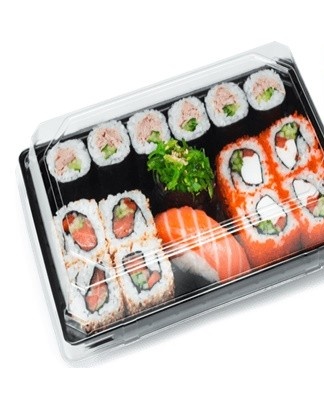How long can you store rolls and sushi at home, rules and shelf life
Rolls are one of the dishes of Japanese cuisine that have become part of our lives. It is served in the form of rolls, made with rice, nori and any filling. You can enjoy the taste of an exotic dish in a restaurant or cafe, but you can also cook it yourself. Fresh fish is used as the main ingredient, which is classified as a short shelf life product. Delicacy lovers should know how much sushi and rolls are kept in the refrigerator.
Differences between store sushi and homemade sushi
Lovers of Japanese cuisine will always know how to distinguish exotic commercial dishes from those they prepare themselves. First, homemade sushi is much fresher than that sold. Second, purchased sushi must be consumed the same day it is purchased. But leaving them overnight is undesirable, while homemade ones (if left) can be stored for several hours, since they are made only from fresh, high-quality products.
Important! The filling, if it consists of fish, requires special conditions, both freezing and its subsequent storage.It is also not recommended to store rolls prepared with vegetables for a long time, as they lose their taste, appearance and freshness. And in general, before buying a dish of Japanese cuisine, you need to check the expiration date and carefully read not only its composition, but also the manufacturer's recommendations.
Choice of utensils for storage
To slightly extend the shelf life of a Japanese dish, you can use utensils such as:
- a flat porcelain or wooden plate - put the remaining rolls on it and wrap it several times with cling film;
- a plastic container with a sealed lid - put rolls or sushi in it and close the lid, then put the container on the refrigerator shelf.
Sellers, releasing rolls in specialized stores, put them in a container and cover with a lid. When ordering from home, the chefs do the same before handing over the finished product to the courier. This type of packaging is ideal for transport, but it does not offer security and if air enters, the rolls deteriorate more quickly. Therefore, after returning home or after receiving an order from the courier, you should immediately transfer the contents of the container, and the remaining rolls are placed in the dishes and put in the refrigerator.
But the safest option for health is when the rolls are baked or bought for one meal.
Storage methods
How to store and how long the buns can stay edible depends on how they are stored.

At room temperature
The shelf life of rolls, compared to other dishes, is minimal, so they should be kept cold.But if this is not possible, it is advisable to place them in a dark and cool place. The main thing is not to forget that at room temperature they will be able to retain their taste and appearance only for 3 hours. That is why immediately after baking, the buns should be eaten.
In the fridge
The rolls are kept in the refrigerator for 48-72 hours (especially if they were prepared on their own, at home).
With fresh fish
It is not recommended to store rolls containing fresh fish. After cooking, they are eaten immediately. Therefore, it is recommended to visit Japanese restaurants and eat a properly prepared dish there.
It is also possible to order sushi with fresh fish at home, but it will be quite difficult to check the quality of the product. Ready rolls are stored for a maximum of 2 hours.
With salted fish
The shelf life of these rolls does not exceed one day in the refrigerator, and you should not exceed the recommended time for more than 12 hours. This is only suitable for meals that have been prepared with fresh ingredients at home. This does not apply to rolls from the store - if you save them and eat them the next day, then juicy rolls are likely to acquire an unpleasant smell and a specific taste.

Cooked
Fried, boiled and hot-smoked fish in rolls is rarely used. But there are such sets where there are buns that are baked using special kitchen equipment or fried in vegetable oil. The person who ordered the buns gets an extra container wrapped in foil from the courier. This is due to the fact that a cold dish loses all its taste, and during such transportation the dish does not have time to cool.It is recommended to store them in the refrigerator for no more than 12 hours. There is no point in reheating them before use, as they won't taste very good.
can i freeze
You should not freeze the buns, because after defrosting they lose their texture and completely change their taste. Yes, the freezer considerably prolongs the preservation of any food, but as far as rolls are concerned, they should not be eaten after defrosting.
How to check the freshness of a dish
Anyone (even far from all the characteristics of Japanese cuisine) can independently determine whether a dish is fresh in front of him. First of all, before starting a meal, he needs:
- Look carefully at the piece of fish - it should be perfect. The presence of film and abrasion is unacceptable. If the fish is spoiled, it immediately becomes dull. A pale color indicates that the seafood has been frozen for a long time.
- Slowly inhale the smell of food - if it smells strongly of fish, you cannot eat the dish. Fresh rolls smell only slightly of iodine.
- Evaluate the sheet of nori: its surface should be shiny and smooth, and due to the absorbed moisture, soft. Drought is not acceptable.
- Focus on the rice - it should be white and soft. If the grains are dry and separated from the buns, then you should not endanger your health and eat such a dish.
After making sure that everything is in order with the dish, you can taste the fish. It should melt in your mouth. Stiffness and tightness are signs of an undercooked dish. But it's a completely different matter if the rolls were ordered with squid or octopus - such meat should stretch slightly during chewing.

In order not to risk your health, it is worth excluding sushi with salmon from the diet, the meat of which can be infected with dangerous parasites that live in fresh water.
Consequences of using the delay
Unfortunately, poisoning with exotic foods is quite common. This is especially true for sushi and raw fish rolls. They may contain heavy metals or parasite larvae, which grow rapidly if the preparation and storage regime is violated.
It is not recommended to eat sushi every day, it is better to feast on the dish only a few times a month to avoid unpleasant consequences.
During use, it is necessary to season the buns with wasabi sauce, which, when properly prepared, has an antibacterial effect. It is also dangerous to eat rolls with an expiration date. Using such a dish leads to disastrous consequences:
- acute indigestion (nausea, vomiting, diarrhea);
- infection of the body with helminthic parasites;
- gripping pain in the navel area;
- staph infection.
So, having studied some of the nuances, you can assess the quality of the finished dish. If the product is freshly prepared and contains no perishable foods, it can be stored for 24 hours.
It is dangerous to eat a dish if the filling has become hard, dry, vegetables are soaked, runny or sluggish. In addition, care should be taken when purchasing a finished product, especially if the price is significantly different from the cost price (in order to make a profit, unscrupulous entrepreneurs violate the terms of maintenance and sale). When buying rolls in stores, you should pay attention to labeling, production time and product appearance.



